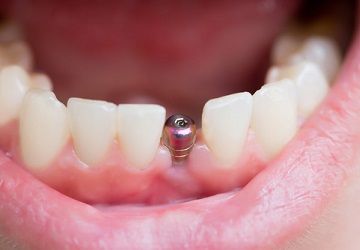Study Suggests Certain Drugs Can Influence the Success of Dental Implants
Researchers at McGill University have completed a study examining the relationship between dental implant failure and certain commonly prescribed.

Researchers at McGill University have completed a study examining the relationship between dental implant failure and certain commonly prescribed medications that many patients are currently taking. They found that one medication seems to help implants attach properly, while another hinders the implant from being successful.
The study was conducted by a research team who reviewed data from more than 700 patients receiving treatment at a New Brunswick clinic between 2007 — 2015. Results were later confirmed in studies using rats. The two types of drugs included in the review were beta blockers, commonly prescribed for high blood pressure, and heartburn medications.
Beta blockers have already been shown to increase bone formation, and over 640 million people around the world currently take this type of medication to control their high blood pressure. One of the research team members, Professor Faleh Tamimi explained that their original hypothesis was that this type of medication might decrease the risk of failure of dental implants. The team reviewed information regarding 1499 dental implants in a total of 728 patients.
· 327 dental implants were in patients already taking beta blockers for hypertension
· 1172 implants were in patients not taking beta blockers
Among their findings were the following:
· In patients using beta blockers, the failure rate of the dental implants was 0.6%
· In patients not using beta blockers, the failure rate of the dental implants was 4.1%
Heartburn medications were also included in the study, since they are quickly becoming the third most prescribed type of pharmaceutical product in the world. For this portion of the study, the investigators looked at records for 1773 dental implants in a total of 799 patients.
· 133 dental implants were in patients taking heartburn medications.
· 1640 dental implants were in patients not taking any heartburn medications.
The findings from this portion of the study showed that:
· Failure rates for patients using heartburn medications were 6.8%.
· In patients not using heartburn medications, failure rates were 3.2%.
Heartburn medications have been shown to possibly reduce calcium absorption and increase the risk of bone fractures and breaks. These findings were surprising to the research team simply because of the high rate of failure in patients using heartburn medications.
While this study was primarily a review of previously reported data, there are still important implications for the dental and medical healthcare industry. Beyond understanding what makes dental implants more successful, it might be possible, in the future, to better predict or influence the outcomes of procedures like hip and knee replacements, which involve the same mechanisms of cellular bone growth and repair. However, before such conclusions can be drawn, more research into appropriate dosages and time periods for taking such medications has to be done.